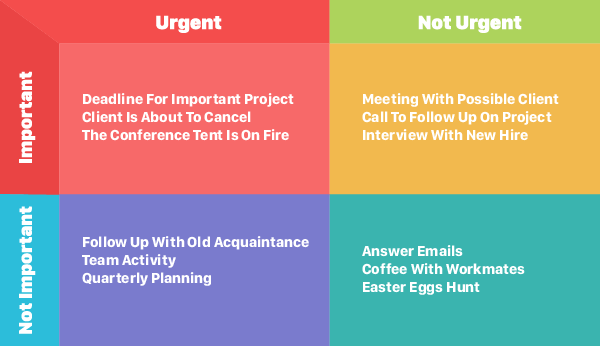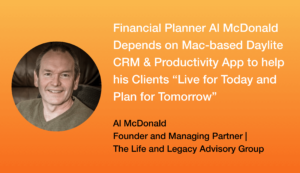Nobody said managing a small business and the issues that crop up would be easy. Challenges that are both immediate and urgent, (a.k.a. fires) and situations out of your control happen.
Instead of being reactive about issues that arise, ask yourself a few basic questions to help become proactive and deliberate about your day. With the tips below it’ll help you stop wasting time slaved to your inbox, stressing over the inane and limit firefighting.
Set your day upright and proactively. Pull your business forward instead of reactively dealing with issues.
Start With The Most Important Question
At the start of each day ask yourself, “What is the most impactful and important task today that will take my business forward based on my goals?” Strategically asking what your most important goals of the day are is a good start. This helps you have clarity on your top priority today so that you can prioritize other fires and tasks from there.
Make time for strategic priorities and matters that are urgent first. There’s still going to be firefighting, but by identifying your top priority you can make sure you’re focused on what matters instead of only dealing with fires. By identifying your key priorities first, you can strategically move forward to achieve your overall goals.
Block Out Your Time
Once you’ve identified your top priority for today, ask yourself when in your day would be best to do this task. Then block out time in your calendar to work on that task. This is also called Timeboxing and is used by people like Bill Gates and Elon Musk! By creating boxes of time for the most important priorities in your calendar allows you to be more proactive about where you’re spending your time. It also forces you to be realistic about your time.
Do this each day to ensure you’re building productive, proactive habits that will allow you to focus your time on what’s most important to your small business.
Check out our YouTube video on Timeboxing!
Building a disciplined, strategic set of self-imposed time constraints to follow will provide needed headspace to figure out what else is to focus on in your day. From here you can ask, “Is this fire more urgent than my top priority today?” There are tools that can help with that question, which brings us to…
The Time Management Matrix
Are you being reactive about your time or are you deliberately focusing on what matters most and will have the biggest impact? While things may feel emotionally relevant or you would like to deal with something immediately, sometimes your time would be best spent elsewhere.
Enter the educator, business leader and author, Stephen Covey’s Time Management Matrix, from his book, The 7 Habits of Highly Effective People. The Time Management Matrix breaks down tasks into four distinct quadrants based on urgency and importance.

Quadrant I: Urgent & Important
This quadrant is for tasks that require your immediate attention and will have immediate consequences if not dealt with as soon as possible. ie. deadlines for important projects, a client you’re about to lose, or a literal fire.
Quadrant II: Important but not urgent
These are tasks that will have a long term impact, but don’t need your immediate attention. Many people interpret this as “long term strategizing and development” ie. things that need to be planned for in advance, like long-term business strategizing. Deliberately make time for tasks in this quadrant to strategically move your business forward. But if your day has many tasks in quadrant one, you can defer tasks that aren’t as urgent.
Quadrant III: Urgent but not important
These are tasks that are urgent but not necessarily important, in that there’s not necessarily a long term benefit from them, but have to be done anyway. Think of them as “time sucks” or “time pressured distractions.” Somewhat ironically, this is where the largest part of your day will be spent. Things like replying to emails, scheduling meetings and booking flights. The best use of your time is to delegate tasks in these quadrants. Your time is valuable, so if you can hand these off to be done by someone else, you will have more time to focus on things that will strategically move your forward, and urgent fires that need your attention.
Quadrant IV: Not important & Not Urgent
This quadrant is for tasks that are unrelated to your professional life and yield no short or long-term benefits necessarily. ie. things like checking social media, watching television or sorting through your junk emails. These can be deferred once more or deleted outright. Don’t worry about these. They can be deferred or ignored.
As you go through your day, for each email in your inbox and to-do that crosses your plate, ask yourself if it’s important and/or urgent. For things important and urgent, do them today. For things not urgent and not important, delete them or defer them. For things urgent but not important, delegate them. And deliberately make time for things important but not urgent.
Prepare for Tomorrow
Perhaps one of the most crucial steps comes at the end of the day. Ultimately, both blocking out time in your calendar and using the Time Management Matrix is about asking yourself questions and being strategic about your time. Take it a step further by asking yourself at the end of the day what the most important thing is for you to focus on tomorrow. Plan it ahead so you avoid getting stuck in your inbox first thing or distracted by what may seem like fires but may not actually be important.
This will help build a proactive, disciplined approach to goal setting, instead of constantly reacting to unnecessary fires and time sinks.
Conclusion
If you want to move from being reactive to proactive, it starts with where you focus your time today. Dealing with things reactively leaves you constantly stuck dealing with the last struggle and busy without making progress. By asking yourself each day what’s most important, blocking out time in your calendar for that priority, and using the Time Management Matrix to weigh each task and email, you will be proactive about focusing your time on the things that will move your business ahead.
Need help managing your leads, clients, projects, and everything else you have to juggle? It’s time for a CRM for small business. Try Daylite free!
About the author:
Xander Cavalier is a former radio broadcaster and community organizer with grass-roots experience in Northern Ontario. He is currently based in the GTA. You may reach out to him on LinkedIn.


